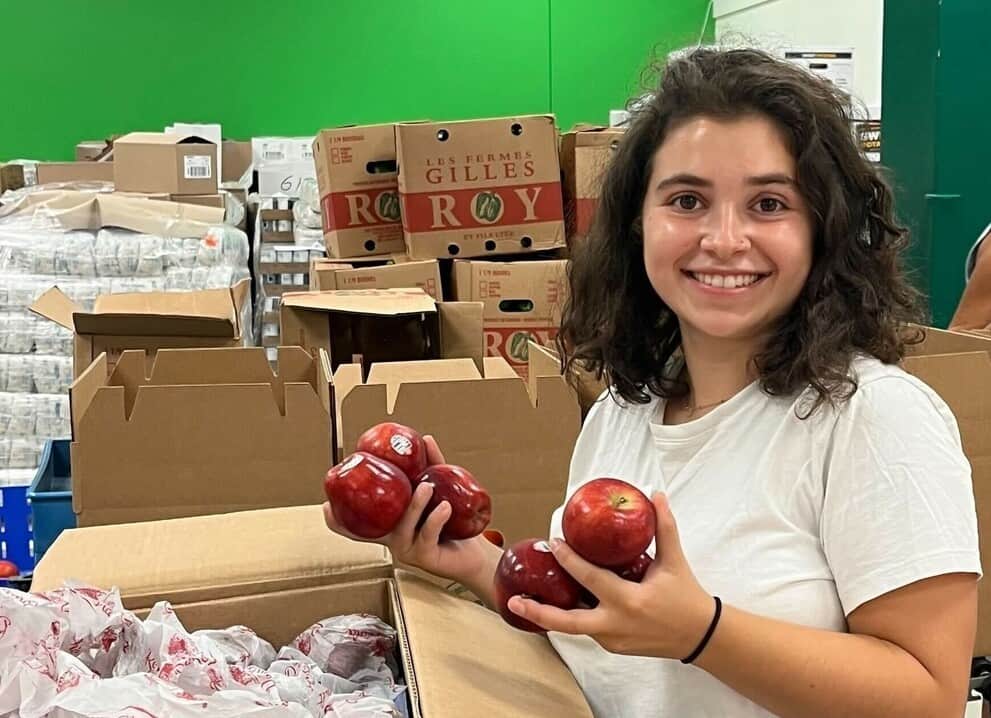Lucy Shapiro is a rising senior at Carleton College studying chemistry and spent the summer interning with the Food For Free Programs team. Below, Lucy shares with us her experiences at Food For Free and reveals the importance of a food access model that provides culturally sensitive foods to its community.
One of my greatest learnings from my experiences as an intern this summer is that people connect culturally to food and feel that they are being treated with dignity when served wholesome and nutritious foods with which they are familiar. Culturally relevant foods help people express their cultural identity, connect with others, and feel empowered. Through this project, I hoped to explore the ways in which Food For Free works to provide such meaningful foods to our communities.
Food For Free continues to expand efforts to procure more culturally relevant foods in their various programs. We emphasize the importance of providing grocery items and producing meals that Food For Free’s clientele finds delicious and relevant to their culture. To do so, Food For Free makes an effort to have conversations with community partners to determine their client’s preferences and natural ways that they connect with food. From my experiences and conversations, I have learned that creating a food model that emphasizes choice for clients, a main focus at Food For Free, is one of the best ways to increase access to culturally familiar foods for community members.
Food For Free’s Weekend Eats program historically sent elementary and upper school Cambridge Public School and Somerville Public school students home with meals and snacks on the weekend. Last summer, Food For Free began to have more conversations with school liaisons and focus groups surrounding the food they were providing to students. Many of the foods provided were popular in “mainstream” American culture, such as sandwiches, and were not being eaten at all. However, replacements such as rice and bean cups were difficult to find in stores and food banks.
In response to that important feedback, and for other logistical reasons, Weekend Eats has fully transitioned to a Carrot Card Program in which food-insecure families of K-8 Cambridge and Somerville public schools receive cash cards to buy groceries. By providing cash cards, families are able to choose and purchase foods that are meaningful to them, which also reduces food waste. Further, this school year, Food For Free will resume choice-based School Markets, a farmers’ market-style food access model that allows community members to choose fresh, healthful, and culturally relevant foods for their families at no cost.
Food For Free’s Just Eats program provides grocery boxes and bulk pallets full of healthful foods to over 4,000 families and individuals in the Greater Boston area each week. To ensure culturally sensitive foods are included in the boxes, Food For Free speaks with partner agencies to learn the most popular foods amongst their communities. Commonly provided produce and starches such as onions, potatoes, rice, carrots, and citrus- the backbone of Just Eats boxes- are used in a variety of cultures and allow most recipients to receive food they are familiar with. In addition, the operations team at Food For Free tries to get access to culturally sensitive foods to include in the boxes or deliver in bulk to partners. For example, for partner agencies that serve a large LatinX population, such as La Colaborativa, the operations team secures foods such as masa and plantains.
La Colaborativa, a non profit organization located in Chelsea, partners with Food For Free to provide groceries to its community. La Colaborativa empowers and uplifts LatinX immigrants in the Greater Boston area through an array of programs and initiatives. At La Colaborativa, providing culturally sensitive foods has been a top priority for their food pantry and food distribution program.
When speaking with Dinanyili Paulino, Chief Operating Officer (COO) at La Colaborativa, she revealed that food shortages and supply chain issues can place a strain on getting any food, let alone culturally sensitive foods. I was curious as to how La Colaborativa was able to provide foods to its clientele that were culturally sensitive and that community members knew how to cook. Dinanyili explained that by partnering with organizations such as Food For Free and using a portion of their funding, La Colaborativa is able to provide their clientele with healthful and relevant foods. Such foods that clients enjoy include masa, plantains, yuca, black beans, and specific types of rice. In addition, Dinanyili mentioned that La Colaborativa provides cooking classes and instructions as to how to cook unfamiliar foods in LatinX communities, such as zucchini, kale, and regular flour.
Similarly to La Colaborativa, as a nonprofit that relies heavily on donated foods and food banks, it can be difficult for Food For Free to obtain culturally relevant food products. Most of Food For Free’s food is from the Greater Boston Food Bank or donated by corporate and retail partners. However, being able to purchase food gives Food For Free the opportunity to select more culturally significant foods for the various communities they serve. Ben Engle, Chief Operations Officer at Food For Free, explained that the ability to procure culturally relevant foods for recipient partner organizations comes down to building relationships and trust and making sure they know that Food For Free will try to procure culturally significant foods from them. According to Ben, “Our Operations Team works hard to source and acquire fresh produce and pantry staples that are widely recognized and relevant to many cultures. We are happy to receive feedback from our partner organizations and allow it to inform our decisions when it comes to weekly offerings. If we are able and have the funding, we’ll acquire or purchase more dialed-in, culturally relevant foods for our partners serving clients looking for those items. Over the past few months, we’ve delivered plantains, masa, bok choy, tokyo bekana, tatsoi, and other items that focused on supporting specific cultural tastes.”
The balance between donated and purchased foods can help Food For Free procure large amounts of fresh, healthful, and diverse foods. Food For Free aims to continue their efforts towards providing culturally sensitive foods to uplift communities and implement a food access model full of dignity.


